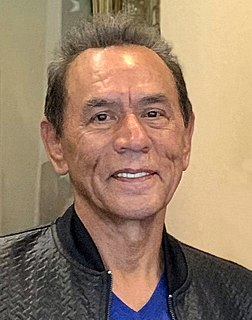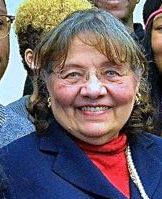A Quote by Wes Studi
I came from a family that was pretty insularly Cherokee. We kept to ourselves - the white people were there, and we were here, and it was practically a segregated kind of thing.
Related Quotes
The strange thing about my life is that I came to America at about the time when racial attitudes were changing. This was a big help to me. Also, the people who were most cruel to me when I first came to America were black Americans. They made absolute fun of the way I talked, the way I dressed. I couldn't dance. The people who were most kind and loving to me were white people. So what can one make of that? Perhaps it was a coincidence that all the people who found me strange were black and all the people who didn't were white.
I'm sure you're gonna be taught, if you haven't already, that the people that were here, the Native Americans were beautiful, they were wonderful, they were at one with nature, and these evil white Europeans like Columbus came in and killed them and took them, imprisoned them, stole what was theirs, took it for ourselves.
My family is Chinese-Taiwanese. I'm from Richmond, Virginia. The community in which I grew up was pretty white. The storybooks you got at school featured white children and an animal, or animals, and as you got older, the novels you were assigned were about, like, the problems of white boys and their dogs.
There was a Yale even before Larry [Kramer] and I got there, and there were three designations of students: "white shoe," "brown shoe," and "black shoe." "White shoe" people were kind of the ur-preppies from high-class backgrounds. "Brown shoe" people were kind of the high school student-council presidents who were snatched up and brushed up a little bit to be sent out into the world. "Black shoe" people were beyond the pale. They were chemistry majors and things like that.
We were segregated throughout the community, and it was pretty brutal, actually. It didn't appear to be, on the surface.People got along and we had great relationships, but there was discrimination that impacted adversely the ability of the African-American community to progress. People did not - were in denial about that fact.
Those who came to the United States didn't realize they were white until they got here. They were told they were white. They had to learn they were white. An Irish peasant coming from British imperial abuse in Ireland during the potato famine in the 1840s, arrives in the United States. You ask him or her what they are. They say, "I am Irish." No, you're white. "What do you mean, I am white?" And they point me out. "Oh, I see what you mean. This is a strange land."
Of course you can more easily recognise the outsiders because they have a different skin color. But let us take for instance the relationship between the White Anglo-Saxon Protestant majority in America and the negroes. What is important here is that the negroes were the descendants from slaves and were excluded from power, while the white majority kept them at bay, kept them down, kept them where they are. If the negroes in the future became assimilated and acquired equal power access, if there were a black president, then many of these things would change.
You know, people see [August: Osage County], and I tell them that it's based on my family, and they assume that I came from some kind of horrible, hysterical circumstances. That's not true. My family, my nuclear family, was actually very close. My mom and dad were great parents and they encouraged a real rich, creative life for me and my brothers. My extended family, like every family, has some darkness, and some violence of some kind, emotional or otherwise, in their past.
There were colored and white waiting rooms everywhere, from doctor's offices to the bus stations, as people may already know. But there were actually colored windows at the post office in, for example, Pensacola, Florida. And there were white and colored telephone booths in Oklahoma. And there were separate windows where white people and black people would go to get their license plates in Indianola, Mississippi. And there were even separate tellers to make your deposits at the First National Bank in Atlanta.
We were together because we were addicted to each other. I was never as intoxicated as I was when we were happy together, and I knew it was the same for him. We were putting ourselves through the wringer for those moments of perfection between us, but they were so tenuous that only our stubbornness, determination and love kept us fighting for them.




































